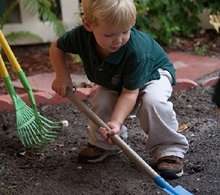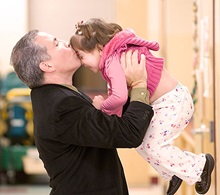 Some of the best memories your child will make are running around, playing outdoors at Preschool, and being active in the amazing summer weather. However, all this running and physical activity in the heat of the day can put children, and adults, at risk for heat stroke, dehydration, harsh sunburns and other related types of complications.
Some of the best memories your child will make are running around, playing outdoors at Preschool, and being active in the amazing summer weather. However, all this running and physical activity in the heat of the day can put children, and adults, at risk for heat stroke, dehydration, harsh sunburns and other related types of complications.
Heat stroke can be very dangerous and not always obvious if you don’t know the signs and symptoms to look out for. The good news is that parents and childcare providers can teach their children to recognize when they are getting too warm and take the right steps to cool off before it gets to that point.
These symptoms may indicate that your child is showing signs of heat stroke:
- Weakness and fatigue
- Nausea or vomiting
- Dizziness and headache
- Muscle cramps
If the child is not adequately cooled off at this point, the symptoms may progress to full heat stroke and include elevated body temperature, hot dry skin, lack of sweat production, rapid pulse, difficulty in breathing and agitation and confusion.
To help you child avoid heat exhaustion or the more serious heat stroke teach them to:
- Always ensure that your child brings water with them outside and that they hydrate regularly throughout the day. At Premier Academy, each child has a water bottle that they have constant access to throughout the day. Children should be limited to water or sports drinks. Avoid soda, energy drink or anything containing caffeine.
- Wearing a hat helps keep direct sun off of your child’s head and wearing lighter colored, loose fitting clothing allows perspiration to evaporate and cool the body.
- Apply sunscreen. Use sunscreen with at least SPF 15 and UVA and UVB protection every time your child goes outside. For the best protection, apply sunscreen generously 30 minutes before going outdoors. Don’t forget to protect ears, noses, lips, and the tops of feet.
- Limit activity during the hottest parts of the day or when humidity is especially high.
- If possible, encourage your children to find games that can be played in the shady areas of the yard or playground during those hours
- Teach your child to recognize when they are feeling too warm and to immediately notify you or their daycare
Last, and most important, never leave a child in a car unattended or leave a vehicle unlocked if there is a chance a child can climb into the vehicle and get stuck inside. The greatest cause of injury and death due to heat stroke is related to children being left in vehicles, often for as little as five minutes, resulting in tragedy that could have easily been prevented.
For any other tips or advice on keeping your child cool in the summer months, ask our amazing teachers and staff at Premier Academy. We are committed to providing you with quality childcare that ensures your child’s safety and growth. Visit our website at premieracademyinc.com for more parenting blogs, tips, and tricks!

 One of the most stressful parts of being a working parent is having a healthy work/family balance. It’s hard for a busy parent not to wonder if they truly are making enough time to spend with family. A quality childcare center will acknowledge that being away from your child is extremely difficult but that doesn’t mean you are a bad parent.
One of the most stressful parts of being a working parent is having a healthy work/family balance. It’s hard for a busy parent not to wonder if they truly are making enough time to spend with family. A quality childcare center will acknowledge that being away from your child is extremely difficult but that doesn’t mean you are a bad parent. As parents and teachers we recognize the importance that reading skills play in our personal and professional lives. We read on a daily basis, and as a matter of fact you are reading as we speak. Once your child hits the appropriate development level to being reading, putting together a reading plan can make later learning a much easier process.
As parents and teachers we recognize the importance that reading skills play in our personal and professional lives. We read on a daily basis, and as a matter of fact you are reading as we speak. Once your child hits the appropriate development level to being reading, putting together a reading plan can make later learning a much easier process.